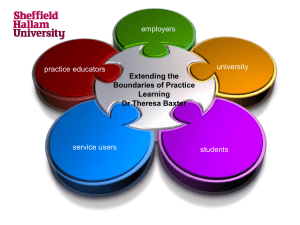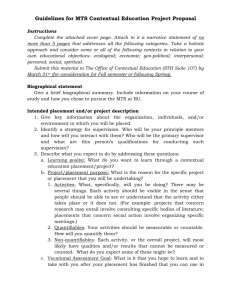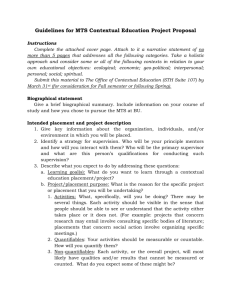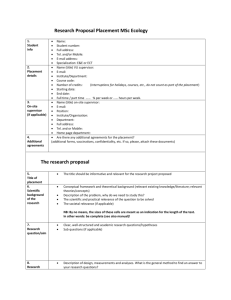Contextual Education Practicum Learning Agreement
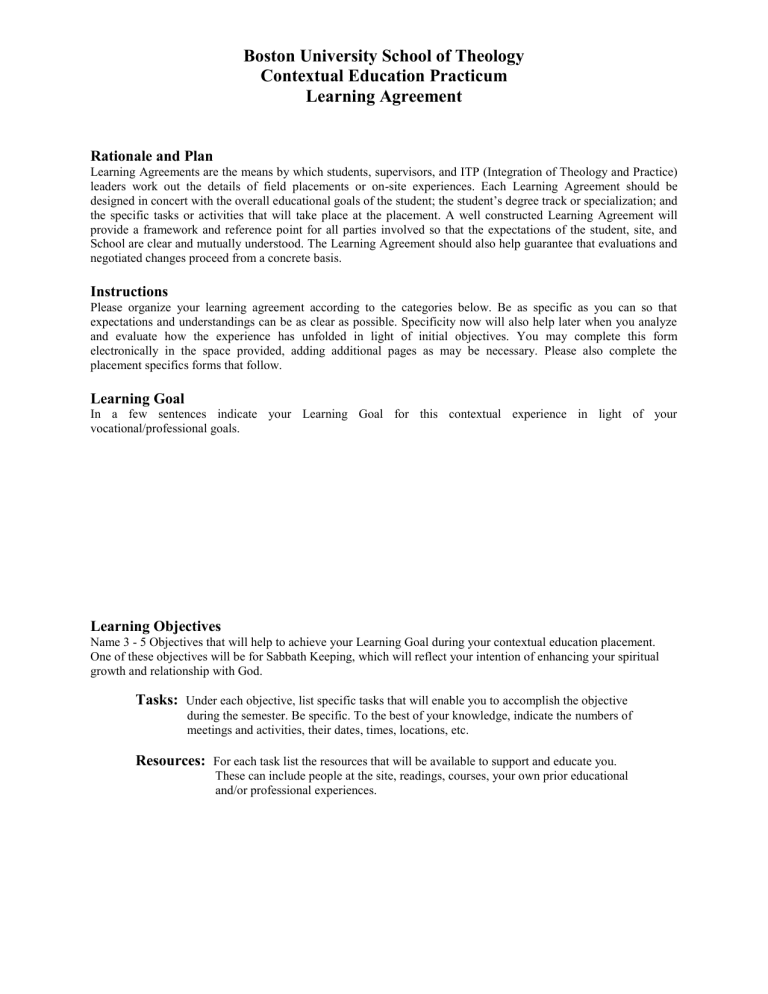
Boston University School of Theology
Contextual Education Practicum
Learning Agreement
Rationale and Plan
Learning Agreements are the means by which students, supervisors, and ITP (Integration of Theology and Practice) leaders work out the details of field placements or on-site experiences. Each Learning Agreement should be designed in concert with the overall educational goals of the student; the student’s degree track or specialization; and the specific tasks or activities that will take place at the placement. A well constructed Learning Agreement will provide a framework and reference point for all parties involved so that the expectations of the student, site, and
School are clear and mutually understood. The Learning Agreement should also help guarantee that evaluations and negotiated changes proceed from a concrete basis.
Instructions
Please organize your learning agreement according to the categories below. Be as specific as you can so that expectations and understandings can be as clear as possible. Specificity now will also help later when you analyze and evaluate how the experience has unfolded in light of initial objectives. You may complete this form electronically in the space provided, adding additional pages as may be necessary. Please also complete the placement specifics forms that follow.
Learning Goal
In a few sentences indicate your Learning Goal for this contextual experience in light of your vocational/professional goals.
Learning Objectives
Name 3 - 5 Objectives that will help to achieve your Learning Goal during your contextual education placement.
One of these objectives will be for Sabbath Keeping, which will reflect your intention of enhancing your spiritual growth and relationship with God.
Tasks:
Under each objective, list specific tasks that will enable you to accomplish the objective
during the semester. Be specific. To the best of your knowledge, indicate the numbers of
meetings and activities, their dates, times, locations, etc.
Resources:
For each task list the resources that will be available to support and educate you.
These can include people at the site, readings, courses, your own prior educational
and/or professional experiences.
BU STH Learning Agreement 2
Objective #1:
Tasks:
Resources:
Objective #2:
Tasks:
Resources:
Objective #3:
Tasks:
Resources:
(List additional Objectives, Tasks and Resources here.)
Supervision
The supervision identified here is different from operational or managerial oversight. It refers to the opportunity that you should have with your supervisor to take time to think about what you are doing and why you are doing it. Often referred to as “theological reflection,” your period of supervision allows you to analyze work, interactions, identities, surroundings, systems and structures, and concepts about God as all these issue arise in the context of day to day activities. A number of tools are commonly used to aid theological reflection. These can include reflection papers, critical incident reports, verbatim reports, sermon feedback forms, or journals. Decide with your supervisor which tools will work best for you.
BU STH Learning Agreement 3
Site Placement Specifics
STUDENT NAME:
Address:
City, State, Zip/Postal Code:
PROGRAM:
MDIV MTS OTHER
Year:
1 2 3 Other
Telephone:
Email:
Supervisor: Site Name:
Address:
City, State, Zip/Postal Code:
Country (if outside USA):
Telephone:
Fax:
Email address and/or Website:
Site affiliation :
BUSTh-accredited site
BTI-accredited site
M.DIV. TRACK:
Pastoral Ministry
Global & Community Engagement
Church & the Arts
Religion & the Academy
_____________________________
BUSTh student-initiated site International placement
Other ________________
M.T.S. SPECIALIZATION:
Hebrew Bible
New Testament
Theology
Religion & Science
Pastoral Ministry (Deacon)
Conflict Transformation
_____________________________
Calendar:
Summer
Beginning Date: _____/_____/_____
DD MM YY
Number of hours in weekly program:
1. Total hours on tasks ___
2. Total hours for task preparation ___
3. Total hours in supervision ___
4. Total hours in travel 1__
5. ITP Group Participation 1.5
6. ITP Group Preparation
7. Sabbath Keeping
TOTAL HOURS/WEEK ii
TOTAL WEEKS iii X
2__
2__
___
___ =
Academic Year
Ending Date: _____/_____/_____
DD MM YY
Vacation Dates i :
From: To:
1.
2.
3.
____ TOTAL HOURS THIS PLACEMENT iv i Consult school calendar as necessary. ii
20/week for concurrent assignments; 35-40/week for summer placements and full-time internships. iii iv
Excluding vacation. For academic year placements, total weeks equal 26.
520 for an academic year placement.
BU STH Learning Agreement 4
Supervision:
The supervisory sessions are key to learning since they offer an intentional time to reflect on actions and experiences. These sessions should average one hour per week. Specify the desired or planned day, time, and place for these and other supervisory sessions.
____________________________________________________________________________________
Day of Week Time of Day Location
Weekly Schedule:
Please give as many details as possible regarding what days and times will be spent on each tasks.
AFTER THIS LEARNING AGREEMENT HAS BEEN COMPLETED, REVIEWED, AND APPROVED
BY THE STUDENT, SUPERVISOR, AND ANYONE ELSE INVOLVED IN IT, THE STUDENT AND
SUPERVISOR MUST BOTH SIGN AND DATE THE FORM. THEIR SIGNATURES INDICATE
UNDERSTANDING, ACCEPTANCE, AND PARTICIPATION IN THE PROCESS OF THIS
PLACEMENT AS DELINEATED IN THE AGREEMENT.
STUDENT NAME (PRINT): _____________________________________________
STUDENT SIGNATURE: ________________________________________________ DATE:
____________
SUPERVISOR NAME (PRINT): ___________________________________________
SUPERVISOR SIGNATURE: ______________________________________________ DATE:
____________
INTERNSHIP COMMITTEE CHAIR __________________________________________
ITP FACULTY: ______________________________________________________
Evaluations:
Due dates and forms for mid-point and final evaluations are found on the STH website. The student, supervisor, and intern committee should complete their evaluations following the guidelines provided by the Office of Contextual
Education. After joint consultation, all parties should sign the final copies and submit them to the Office of
Contextual Education by the due date.
Last updated Aug20, 2014


